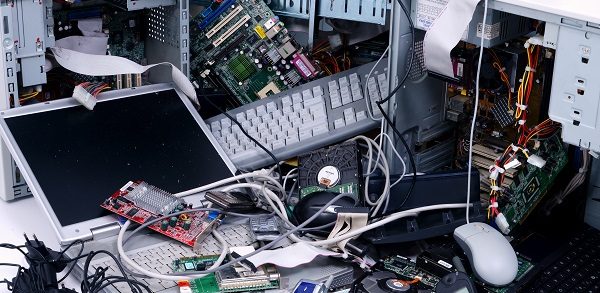
Every business will eventually need to replace their old computers and other electronic devices with updated models. When this time comes, each business must decide what to do with their outdated devices and how to pay for the new ones. Buying new electronics can be expensive, but fortunately, businesses can recover some of their losses by properly disposing of their old electronics with the help of a third party vendor. Here’s everything that you need to know in order to make money off of your business’s old electronic devices:
How Electronic Devices Are Recycled
Before you find out how you can make money, it’s important to understand how e-waste is recycled. E-waste recyclers are companies that dispose of electronic devices such as computers, televisions, cell phones, printers, fax machines, printer ink cartridges, and more in an eco-conscious manner. Unlike other recyclables, these items cannot simply be tossed into a bin and brought to your curb for pick-up. Many of these devices contain harmful substances that can harm people and the environment. If electronic devices are sent to landfills, these harmful substances could potentially contaminate the environment, including the atmosphere and underground water supply.
To prevent this from occurring, e-waste recyclers handle the disposal of electronic devices in specially designed facilities. As soon as the e-waste arrives at the facility, it is manually sorted by workers in an assembly line. These workers must wear protective gear so they are not harmed by exposure to the hazardous materials within the electronic devices. Workers remove batteries, toner ink, and other hazardous parts of the waste. Workers are also responsible for sorting items based on whether they can be reused in their current state or not. Items that cannot be reused as is are sent to the electronic shredder. At ERI, our shredders process thousands of pounds of electronic waste every hour. In addition to processing electronic waste, the shredder is also designed to capture any dust that is emitted from the e-waste as it is broken down into smaller pieces. This dust contains potentially harmful chemicals, so it cannot be released into the facility or outside.
Finally, the small pieces of e-waste that have been processed by the shredder are sorted. The waste will be placed in different bins that separate materials such as plastics and metals. These are the materials that can be resold by the recycler.
Reselling Valuable Materials From E-Waste
Now that you know how electronic devices are recycled, you may be wondering how this process helps your company make money off of old devices. It’s simple. After the e-waste has been broken down and sorted, the recycler is left with piles of materials that can be resold to a number of different parties. Recyclers typically have partnerships with other businesses that are in need of these materials, which makes selling them fairly easy.
What materials are resold? Recyclers typically sell the copper, silver, gold, and palladium found in circuit boards to smelters, who process the material even further and sell the end product on the commodities market. These aren’t the only materials that can be extracted from e-waste and resold. Plastics are sold so they can be reused to create products such as fence posts, trays, and other plastic items. Scrap metal from e-waste can be used to create steel or other metal materials, whereas hard drives can be shredded and processed to create aluminum ingots used in the auto industry.
Even the glass extracted from Cathode Ray Tubes (CRTs) in TVs and computers can be resold, however the process of recycling this material is a bit more complicated because CRTs contain high levels of lead and other toxic substances. Once it has been processed and sorted, the glass can be resold to manufacturers who will use the recycled material to create new TV and computer screens.
E-waste recyclers can also resell devices that are fully functional when they arrive at the facility. These devices will be separated from the rest of the e-waste during the initial sorting stage so someone can inspect them and determine their resale value. If the item can be resold in its current condition, the data will be wiped prior to its resale to ensure that no confidential information falls into the wrong hands.
Making Money From Recycling E-Waste
These are your assets, so you should receive some of the revenue generated through the resale of valuable materials. At ERI, we share revenue generated through the sale of fully intact devices and broken down parts with the client that supplied the e-waste. This gives our clients an incentive to recycle their e-waste in a responsible manner.
The revenue that each client earns will vary depending on the amount of e-waste that they send to our facilities and the current market price of the materials that are being resold. Market prices fluctuate up and down on a regular basis, which means the revenue that we are able to generate by reselling materials will go up and down as well. Talk to a representative from ERI today to learn how our revenue sharing model works.
ERI recycles 98% of the electronics that come into our facilities, which means we are able to resell materials and generate shared revenue from almost every type of e-waste. The only material that cannot be recycled is the wood found on TV consoles and other electronic devices. For more information on how you can make money by recycling your electronics, or to request a quote for your company, contact us today.